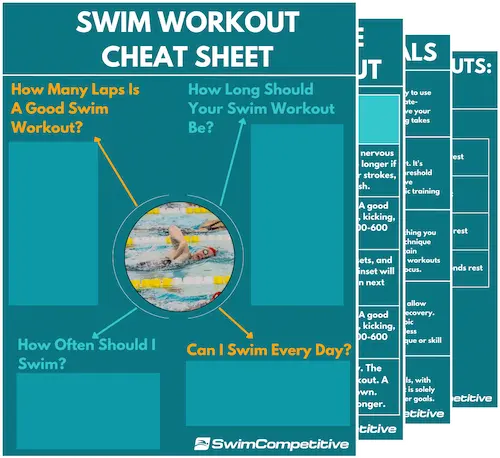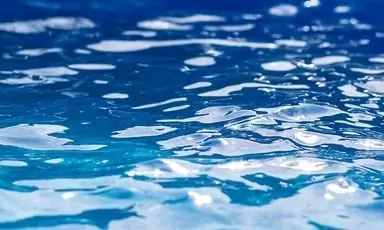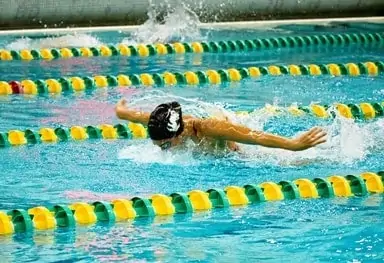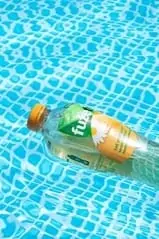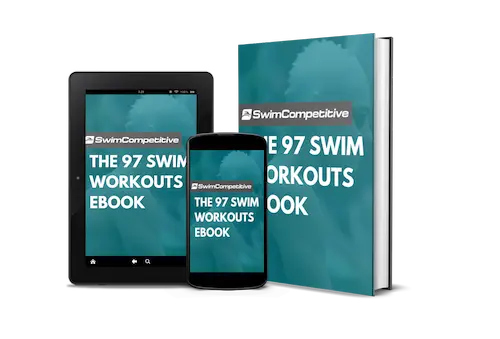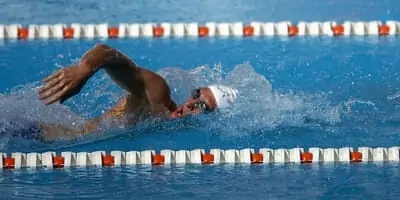Whether you are a seasoned competitive swimmer or a novice lap swimmer, chances are that you’ve experienced the all-so-familiar post-swim fatigue reported by so many swimmers and triathletes after hitting the pool for a good swim workout.
As an experienced competitive swimmer myself, I can also testify to this draining fatigue that sets in after certain swim workouts. After my routine swim workout this morning, I have yet again experienced this sensation of tiredness and have decided to investigate why this might be happening.
To some, this might sound like a strange question to ask since you are naturally going to experience increased levels of fatigue after a workout- after all, you just burned a lot of calories, used different muscle groups, trained your body’s different energy systems, etc.
Like many other swimmers, swimming isn’t my only form of training. I also do other forms of cross-training such as running and strength training to supplement my swimming in an attempt to maximize performance. The point I am trying to bring across is that I’ve never really experienced this same post-workout tiredness from other forms of training which is why it is so strange.
Retired Olympic triathlete, Samatha McGlone has had a similar experience explaining how she would feel great after a long run, but could barely keep her eyes open after a 2-hour swim workout back in her collegiate days of training.
That’s why in today’s article we’ll be covering some possible reasons as to why swimming makes you so tired as well as some ways you can attempt to counter this draining post-swim fatigue and make it through your day.
In short- feeling tired or sleepy after swimming isn’t uncommon and is experienced by many swimmers. Some possible reasons for feeling tired after swimming include the physiological effect of the water temperature on your body, the strenuous nature of swimming, dehydration, swimming workout intensity, nutritional timing, and sunshine.
Why Does Swimming Make You Tired?
Here are some reasons why swimming makes you feel tired or sleepy-
- Water temperature affects physiological systems which can make you tired.
- Swimming is a full-body workout.
- Swimming can cause dehydration.
- Swimming workout intensity can affect energy levels.
- Nutritional timing before and after swimming can affect fatigue.
- Swimming in the sun can make you tired.
Water Temperature Affects Physiological Systems Which Can Make You Sleepy
After a lot of research, one of the most convincing theories I could find to explain this strange post-swim tiredness was the physiological effect of the water temperature on the body.
In a cold(er) pool your body will lose heat much more rapidly than in air of similar temperature due to the heat conductive property of water. Going back to some 9th-grade physics, you might have remembered learning about this phenomenon- heat will always be transferred from a warmer surface area to a colder surface area. In this case, from your skin’s surface to the cold water.
When swimming in colder water temperatures (say below 75°F/ 23°C for example), your body’s core temperature will be slightly lowered. (Normal body temperature is around 37°C). Additionally, your body will also now be expending more energy (on top of the energy already used for swimming itself) in an attempt to maintain that body temperature, which can lead to more fatigue than normal.
After completing your swimming workout and getting out, your body will start to warm up to reach a normal body temperature once again. Your body responds the same way to this warm-up process as it would to consuming a hot drink or sitting in front of a fire on a cold day- ultimately making you feel sleepy.
So, in theory- it is not as much the cold water temperature that makes you tired, but rather the reheating process afterward.
On the contrary, swimmers also tend to experience increased tiredness when swimming in warm water. In the same light, your body’s regulating systems will now be expending fluids to cool you down, which can lead to dehydration, but more about this later.
Overheating can also increase your metabolic rate and heart rate all adding to the physiological effort to keep your body cool, which may cause you to feel tired or sleepy.
What to do about it: In a perfect world, the best thing you can do is to find a swimming pool with an ideal water temperature. This would be around 78-80°F/ 25-26°C which is just about perfect for training without getting too cold or hot. (This is also the pool temperature for Olympic racing).
Obviously, we live in no perfect world, so if your pool temperature is warmer or colder, don’t stress it too much (unless it’s really cold/ warm). If it is warmer make sure to consume a lot of water and if it is colder try to speed up the warm-up process and to get blood flow going after you are done swimming.
This can be done by doing some mobility work such as foam rolling or yoga (which is only going to benefit your swimming) or you can also do a quick 10- to 20-minute jog or cycle. Additionally, if you have to do some strength training on a swimming day you can do that workout right after swimming (just make sure to fuel up properly, both before and after swimming).
Taking a warm or cold shower afterward is also recommended by some. A warm shower will help to get your core body temperature up faster (and without your body having to use energy to do it), while a cold shower can help to lower your body temperature if you are already warm- cold showers tend to also provide a bit of a wake-up shock which should help shake off any feeling of sleepiness.
Swimming Is a Full Body Resistance Workout
One of the more obvious causes for the draining post-swim fatigue may just be the strenuous nature of the exercise. Throughout the 4 main swimming strokes, namely butterfly, backstroke, breaststroke, and freestyle, you’ll be using all of the muscle groups in your body, especially the bigger muscles such as the back, abdominals, chest, quads, hamstrings, and glutes.
Utilizing all of these muscles at once will require a significant amount of energy. On top of that, after a hard workout, your body will have to repair itself and unlike recovering from some other workouts where you only use certain muscle groups, your body will have to be repairing all of its muscles, not just a few different muscle groups.
Additionally, your body will be under constant resistance while swimming since water provides roughly 12 times the resistance of air. That said, the buoyancy of water almost completely removes gravity’s pull on your joints, making the workout low-impact in terms of stress on the joints.
On the flip side, this then causes any stress of movement to shift to the muscles, making swimming both an aerobic and anaerobic workout challenging all of the body’s different energy systems which can easily wear you out.
What to do about it: Making sure that your body can recover properly will help to cut down on fatigue by getting your body in normal condition as soon as possible. It is important to consume adequate nutrients to fuel your training and recovery.
Eating larger meals before swimming should be done 3-4 hours beforehand. Smaller meals should be consumed at least 30 minutes before hopping in the pool. Make sure to consume all of the nutrients such as proteins, fats, and carbohydrates.
Post-workout meals are equally as important. Make sure to have a well-balanced meal when getting home. Other recovery methods include foam rolling, stretching, ice-baths, adequate sleep (8-10 hours) and naps (just make sure that you’ll be able to get up again if you decide to opt for a short nap).
Dehydration Is a Cause for Fatigue
Many people don’t realize it, but swimming causes the body to sweat quite a bit more than you’d think. While swimming doesn’t cause the same level of sweat as land-based workouts such as running you still definitely sweat as reported by the Human Kinetics Journal. The difference is that swimmers are less likely to notice sweating as the water will immediately wash it off.
As discussed a bit earlier, when training in warmer water you will also be much more likely to get dehydrated as your body will be sweating more than usual. Apart from dehydration, sweating can also cause you to lose valuable electrolytes and minerals which play an essential role in proper body function. Not having enough of a certain mineral can also lead to fatigue.
According to WebMD, dehydration is one of the leading causes of fatigue. Thus if you are feeling tired after a hard swim workout, it may be that you haven’t drunk enough water and liquids.
On the same spectrum, Healthline has also found vitamin/ mineral deficiencies to be a major cause of increased fatigue. Some of the vitamins that affect fatigue include- vitamin D, vitamin B 12, iron, magnesium, and potassium.
Additionally, research has shown magnesium deficiencies to be quite common among athletes, and that strenuous exercise (such as swimming) may require an increased uptake of magnesium by 10-20%.
What to do about it: It is recommended that athletes should consume half an ounce to an ounce of water for every pound of body weight throughout the day. That would mean that an athlete weighing 150 pounds should consume anywhere from 75-150 ounces (2.21-4.43 liters) of water throughout the day.
It’s important to find what works well for you and also to make sure to consume that water evenly throughout your workouts as well (even if you’re not thirsty) and not just when you feel like it.
To avoid, losing excessive amounts of vitamins, minerals, and electrolytes (which may be a cause for increased fatigue), you can consume a sports drink throughout your workouts as well, or possibly supplement certain minerals such as magnesium if you know that you have a deficiency. (We advise you to speak to your local doctor if you believe that you may have a deficiency).
Do You Want to Make Every Lap Count?
Stop wasting your time in the pool feeling lost and doing directionless swim workouts, and start training effectively! Our ebook contains 97 structured and goal-orientated swim workouts to help you become a better, faster, and fitter swimmer. Whether you’re a complete beginner or a seasoned pro, there are a multitude of workouts for every type of swimmer.
Workout Intensity Affects Energy Levels Differently Than You May Think
In swimming, workout intensity refers to how fast you swim, rather than how far you swim. The same goes for weight lifting– intensity is commonly referred to as the amount of weight you lift rather than the amount of volume you do.
It may seem contradictory, but a lot of swimmers tend to feel more energized after a hard workout rather than an easier one. This effect is known as excess post-exercise oxygen consumption among scientists and simply as after-burn to most other exercise enthusiasts out there.
If you have experienced after-burn you may find it hard to fall asleep the night after a hard workout or race, despite being physically exhausted. The effects of afterburn typically last anywhere between 30 minutes to 24 hours before your body returns to its normal resting state.
What to do about it: This can be used to your advantage. Try to schedule your high-intensity workouts for the mornings, these should mainly include sprints and race-pace intervals. This way you’ll be able to get the most out of the increased post-workout alertness. Endurance swim workouts are best suited for later evenings where you will be able to head to bed afterward.
Nutritional Timing Can Have an Effect on Post-Swim Tiredness
We already briefly discussed nutrition a bit earlier, but seeing as it’s one of the most important factors of being a good swimmer (and athlete in general) we’ll quickly take a more in-depth look at it and how it could contribute to feeling sleepy after swimming.
A lot of the times that I have experienced this post-swim tiredness is when swimming earlier in the mornings rather than in the afternoon. It also just so happens that for a lot of swimmers around the globe swimming workouts tend to be the first thing in the morning.
Many swimmers tend not to eat much- if at all- before hopping in the pool early in the morning (I used to do this in the past). A swimming workout followed by 8-10 hours of fasting will only leave you tired and depleted which will set you up for a post-breakfast crash after completing your workout.
What to do about it: I recommend trying to get in at least a few calories before hopping in the pool. It doesn’t have to be much- something light such as a small bowl of granola with yogurt will work well. The key is to try and keep the meal balanced.
What I mean by this is to include a bit of everything- carbs, proteins, and fats. Eating a purely high-carb breakfast is only going to set you up to feel tired and sleepy afterward.
In terms of meal timing, it is best to consume smaller meals roughly 30-45 minutes before working out, while you should consume bigger meals at least 3 hours before your workout, allowing some time for the food to start the digestive process.
Caffeine is another nutritional beverage which with the right timing and dosage will help to elevate your energy levels, usually within a few minutes. I don’t recommend only having a coffee before heading to the pool though. That said, a smaller coffee paired with a light breakfast might just do the trick.
It is also important to remember that the effects of caffeine wear off after a few hours- and so you might feel a crash in energy levels. Therefore it is recommended to have smaller doses of caffeine throughout your day, instead of one big coffee as it will set you up for an energy crash.
Also, remember that your body will build up a tolerance to caffeine over time- so use it sparingly for those days where you need a bit of a boost to fight away the feelings of tiredness after a hard swimming workout.
If you need some more tips on what to eat before swimming in the morning, consider checking out our article on it here.
Sunshine Can Make You Feel Sleepy
Many people claim to feel sleepy and tired after spending time in the sun, which according to Sleep.org does, in fact, seem to be true. Despite some of the more obvious reasons which we have covered already such as overheating and dehydration, sun exposure can also cause chemical changes in the body which can contribute to fatigue.
That said, many swimmers tend to swim most of the year indoors and still experience this post-swim fatigue and tiredness, meaning this probably isn’t the root cause of the problem, although it could still contribute in some cases.
What to do about it: For those who are lucky enough to train outdoors most of the year (myself included), it is recommended to try and schedule your swimming workouts earlier in the morning or later in the afternoons to avoid catching the sun when it’s directly overhead. Also, remember to wear your sunscreen!
Feeling Tired After Swimming Isn’t Uncommon
Feeling tired and drowsy after a good swim workout isn’t uncommon, and it’s often experienced by many swimmers. Keep in mind that the reasons for why you might feel tired after a swim workout will be different for everyone and that there is usually no single cause, but rather a combination of factors that can contribute to it.
I recommend trying to implement some of these tips and to do some testing yourself to see which works best for you or if you can pin down an exact cause for feeling sleepy and tired after swimming. In general, a lot of these tips are just good to implement anyway and will help you to become a better swimmer regardless of whether they decrease your post-workout fatigue.
